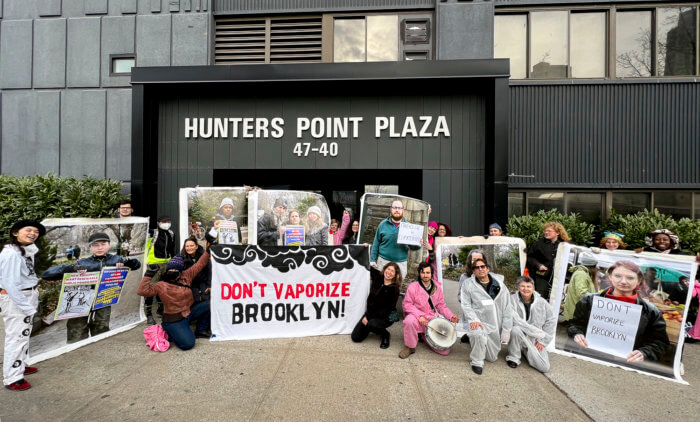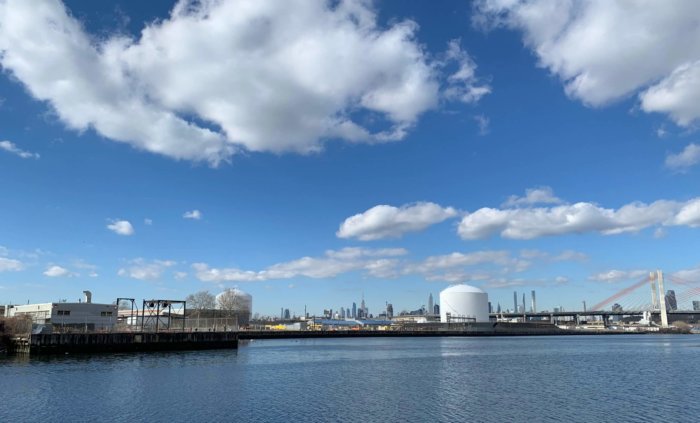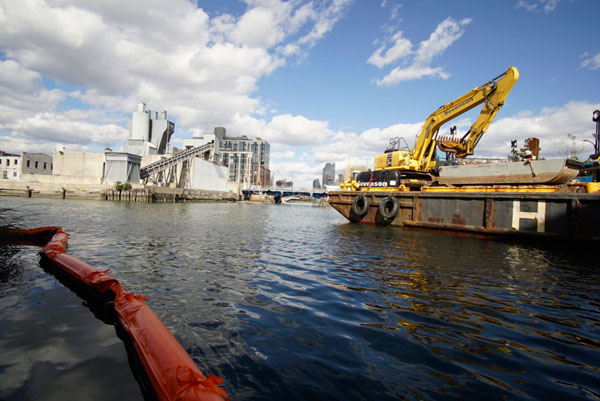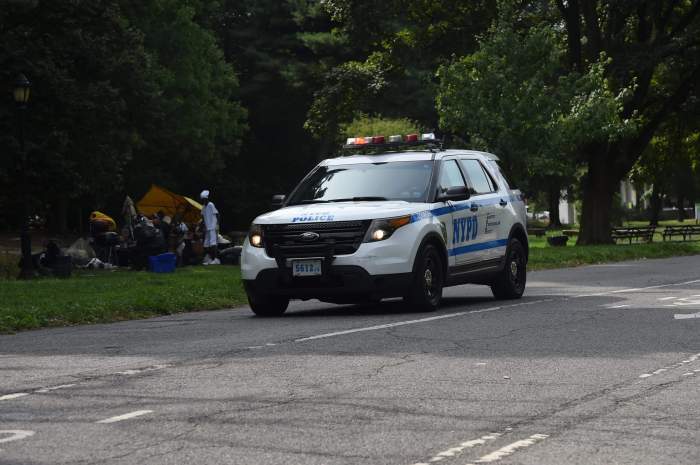Environmental activists rallied outside the state Department of Environmental Conservation’s headquarters on Tuesday morning, urging the agency to put a stop to National Grid’s plan build new natural gas infrastructure at their Greenpoint depot.
Almost two years ago, the British energy giant applied for less restrictive air pollution permits, which would allow it to construct two new Liquified Natural Gas vaporizers at their Maspeth Avenue depot.
Community members and activists have fought the permits at every turn, saying the new vaporizers would be inconsistent with the state’s goal to lower greenhouse gas emissions as part of the Climate Leadership and Community Protection Act and that the company has failed to adequately assess the environmental impact of the new vaporizers.
National Grid said the new vaporizers, which would turn stored liquid gas into a vapor, are needed to more efficiently meet the needs of its customers. The vaporizers are only used on the coldest days of the year — often turning on for just a few days every winter.
For almost as long as they’ve been fighting, the DEC has been delaying its decision on whether or not to delay the permits, repeatedly getting permission from National Grid to extend the deadline as they gathered community feedback and new information from the company.

On April 5, organizers gathered to tell DEC they’re tired of waiting. They want the agency to issue a “No,” and they want them to do it by the most recently-promised deadline: May 7.
“Deny the permit, don’t delay! Environmental justice communities have been poisoned by the fossil fuel industry for decades in North Brooklyn,” said the No North Brooklyn Pipeline Coalition, in a statement. “We once again remind the DEC and Governor that disadvantaged communities are living next to this polluting fracked gas facility today. The climate crisis is here today. In 2022 delay is denial and it costs lives.”
National Grid did not immediately provide comment on the protest.
Coalition members dressed in pink and white scrub suits laid down in formation in front of DEC’s Long Island City headquarters, spelling out “NO LNG” with their bodies, then stood in front of the building’s doors with banners and handed out flyers to employees walking into the building for the day.
The activists also demanded that the DEC shut down the completed parts of the North Brooklyn Pipeline, also known as the Metropolitan Natural Gas Reliability Project, a natural gas pipeline that snakes through the borough from Brownsville to Greenpoint.
Two federal agencies, the Environmental Protection Agency and the Department of Transportation, opened investigations into the project after a coalition of community groups lodged a civil complaint accusing National Grid and the DEC of violating civil rights laws.
The DEC was most recently supposed to make a decision on the permit by Feb. 7, but asked National Grid to extend the deadline by three months just about a week before the decision was due, citing an ongoing effort to read and respond to public comments.
Days before asking to extend the deadline, DEC asked National Grid to supply an updated CLCPA analysis.
In the Jan. 24 letter, the department noted that, if the new vaporizers were found to violate climate guidelines, it would need to justify that the project was needed badly enough to warrant an approval and provide a plan to lessen the impact of greenhouse gas emissions.
“DEC is also reviewing the CLCPA analysis provided by National Grid that addresses current and future potential greenhouse gas emissions related to the application,” a department spokesperson told Brooklyn Paper. “This analysis includes alternative or mitigation measures that National Grid proposes will reduce the impact of this proposed project’s emissions on neighboring environmental justice communities, should an Air State Facility permit be issued.”
The letter posed a series of questions about the project, and noted that while National Grid had already outlined some greenhouse gas mitigation measures, they may not have been “sufficient or adequate.” DEC asked the company to lay out additional mitigation measures, which they said could be “technological, financial, operational, or physical in nature.”

The department also asked National Grid to explain whether or not the city’s newly-enacted ban on new gas hookups would reduce demand and thus, the need for the new vaporizers; and to confirm the project is needed to improve service reliability — and will not be used to increase the amount of gas stored at the Greenpoint facility.
Last fall, DEC denied permits to two would-be natural gas facilities in Astoria and Newburgh, saying both projects violated the CLCPA and could not justify the need for the infrastructure.
The companies behind the applications, NRG Energy and Danskammer Energy, are seeking to appeal the decisions.
In a December 2021 report, National Grid said if the permits for the Greenpoint Energy Center were obtained by February 2022, the new vaporizers could be on line by late 2023. If delays continued, the project would not be finished until 2024. The report warns that the likelihood of not receiving the permits from DEC was high — a similar report issued six months earlier ranked the likelihood of not receiving the permits “medium.”























